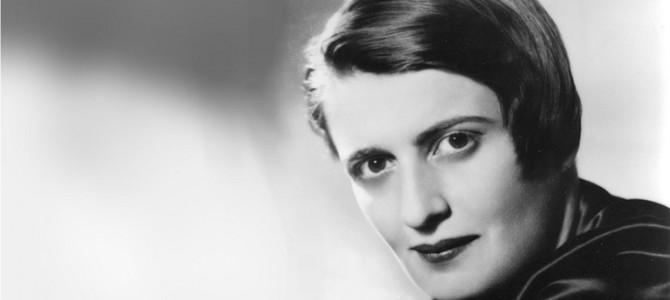
Did you know that the incoming Trump administration is an Objectivist conspiracy intended to install a cabal of Ayn Rand “acolytes” at the highest levels of the United States government?
Neither did I, and I actually am an Objectivist. So you can imagine my excitement at reading a somewhat hysterical warning from the Washington Post‘s James Hohmann that “Ayn Rand acolyte Donald Trump stacks his cabinet with fellow Objectivists.” How come nobody told me we were taking over?
Alas, the substance of the report is way more mundane. Trump has said in one interview—and nowhere else, to my knowledge—that he is a fan of Rand’s novel The Fountainhead. All of the other reports about “fellow Objectivists” are similar: they’re stories about Trump nominees at some point in the past reading, praising, and recommending Rand’s novels.
This is actually totally normal. If I can sum up this report, it would be: “NEWS FLASH—Conservative Businessmen Read Ayn Rand.” If you’re in a bit of a liberal bubble, I guess that’s news to you. But it shouldn’t be. Rand’s novels have sold millions of copies and have a lot of fans. Right-leaning people, especially those in the business world—which Rand famously celebrated, treating businessmen as heroes instead of stock villains—frequently read her novels and recommend them.
There is obviously a big difference between liking an Rand novel and being an “Ayn Rand acolyte,” whatever that means, or being an “Objectivist.” Objectivism is the formal name Rand gave to her philosophical system, and it was a whole system, with positions on everything from the validity of the senses to the nature of abstractions to the factual basis for morality to the psychological function of art. Her pro-capitalist politics was only a part of this larger system. Obviously, many of the Rand fans who like her novels and are sympathetic to her politics don’t agree with all of these other things.
To his credit Hohmann notes this, mentioning that Andy Puzder, Trump’s pick for Secretary of Labor, also recommends Mere Christianity by C.S. Lewis. Rand’s Objectivist philosophy, by contrast, is rather conspicuously atheist.
The problem is that Hohmann is trying to fit the Rand angle into a narrative about the supreme awfulness of the supremely awful Trump administration. “The fact that all of these men, so late in life, are such fans of works that celebrate individuals who consistently put themselves before others is therefore deeply revealing. They will now run our government.” Are you frightened now? Because I’m pretty sure you’re supposed to be frightened.
Hohmann would have been better served by asking what these business leaders took from Rand as the message that inspired them. Again, there are a few hints. Puzder says that it’s about encouraging his kids to live “the kind of lives of achievement, integrity, and independence that Rand celebrated in her novels.” Congressman Mike Pompeo (referred to in the article) explained that Rand’s impact was because, “I spent my whole life working hard,” a virtue her novels promoted, and because, “I eat and breathe small government and freedom.”
Oh, no! Important figures in the new administration have been influenced by an author who advocated freedom. And integrity. Does that perhaps sound a little less frightening?
Rand is influential on the right for her celebration of work and achievement, her defense of capitalism, and her scathing critique of government intervention—all major themes of Atlas Shrugged. But she is also well-known among a broader group of fans—including quite a few political liberals—for the themes of The Fountainhead, which celebrates independence and individualism and is about being motivated by creative work rather than the attention or approval of others.
This throws a little cold water on the idea of Trump as an “Ayn Rand acolyte,” because when you think of people who are serenely unconcerned about what other people are saying about them, you don’t exactly think of Trump.
If Hohmann needs to know what actual Objectivists think about Trump—well, reach out, we’re not that hard to find. Most Objectivists I know opposed Trump in the primaries and definitely don’t think of him as one of us. Objectivists are ideologues in the best sense of the word. We’re people who think big ideas and abstract principles are important. Rand titled one of her non-fiction books Philosophy: Who Needs It—note the absence of a question mark. This also is not what you think of when you think of Trump. Most Objectivists recognize him as a pragmatist in the worst sense of that word: as someone without fixed convictions and principles and without any sense that he needs to have them.
While we don’t have high expectations for Trump, we’re happy to see some Rand fans going into his cabinet, and we hope that her love for the cause of freedom and individual rights and for the virtues of integrity and independence will have some significant influence on them. That’s the kind of ideological conspiracy the country could really use right now.
Follow Robert on Twitter.









